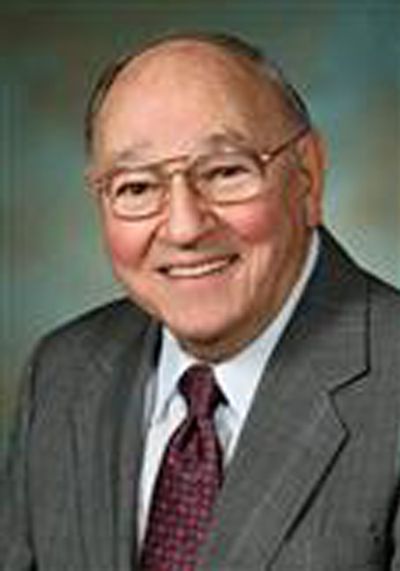Illness forces McCaslin to quit state Senate

OLYMPIA – Bob McCaslin, the most senior member of the Washington Legislature, is leaving the Senate seat he’s held for the Spokane Valley for 30 years.
In a prepared statement, McCaslin said health problems have resurfaced and changed his plans to serve out his term, which ends in 2012. He’ll step down as the third-longest-serving senator in state history.
“I’ve always tried not to let the years slow me down or affect my ability to serve the people of the 4th District, but as my doctors have made clear to me, that can no longer be the case,” he said in the statement released by his Senate office.
McCaslin, 84, also serves on the Spokane Valley City Council, a post he intends to keep.
“Oh, absolutely it has nothing to do with the council,” he said Tuesday after the council’s regular meeting. “It has to do with traveling and living over there.”
McCaslin said he has been diagnosed with myelodysplastic syndrome, a bone marrow disorder that prevents him from producing enough red blood cells, white blood cells and platelets. He has received weekly blood transfusions for the past several months, a process that requires six hours to complete.
According to the Leukemia & Lymphoma Society’s website, the disease is sometimes called pre-leukemia and can develop into acute myelogenous leukemia.
Even with the diagnosis, McCaslin said he had planned to take his Senate seat next week, even going so far as to arrange for a golf cart so he could get around better in Olympia. But in recent days he developed a broken blood vessel in his leg.
“It was a very sudden decision,” he said.
McCaslin, 84, underwent heart surgery last February, which caused him to miss most of the regular session and the 30-day special session. He was later hospitalized for an infection.
Senate Minority Leader Mike Hewitt, R-Walla Walla, said he heard from McCaslin on Tuesday that he would not be returning to Olympia for the upcoming session, which starts next Monday.
“I’m going to miss him,” Hewitt said, adding that McCaslin served as both the institutional memory of the Senate Republican caucus and a calming influence during contentious times.
But the upcoming session, in which the Legislature must reduce the state’s general operating budget by some $4.6 billion, will be long and strenuous, Hewitt said, adding, “I understand his decision.”
Senate Majority Leader Lisa Brown, D-Spokane, said she would miss McCaslin’s wit and knowledge of legislative procedure.
Brown recalled when she was first elected to the House and went to meet McCaslin, who was already a senior member of the delegation. “He shook my hand for the first time, looked at me and said ‘I know you’re a Democrat, but you’ve got to get a stronger handshake.’ ”
A conservative from a conservative district, McCaslin could sometimes surprise colleagues, she said, like the time he worked with Sen. Jeanne Kohl Wells, a Seattle liberal, to clarify laws on medical marijuana.
His wife had had cancer, and McCaslin said at the time: “I believe anyone dying is entitled to anything, whether it’s legal or illegal.”
A former Kaiser Aluminum employee and real estate agent, McCaslin was elected to the state Senate in 1980. He was the first Republican since the Depression to win the district’s Senate seat, and he easily dispatched Democratic challengers in successive elections. The district stretches from the Spokane city limits to the Idaho border and from the south Valley to Spokane County’s northeast boundary, but the bulk of the voters live in the Spokane Valley.
He ran against then-Mayor Rich Munson and won a seat on the Spokane Valley City Council in 2009.
McCaslin’s retirement means Republican precinct committee officers in the 4th District will choose up to three nominees as a replacement for the remainder of his term. Spokane County commissioners select one of the nominees by a majority vote. If the commission were to deadlock, the seat would be filled by the governor.
State Rep. Larry Crouse, the Valley’s senior House member, said he was not going to apply for the Senate seat, because it would involve trading his seniority in the House, where he is among the most senior members, for freshman status in the Senate. “It’s the same work, the same hours, the same pay. I just feel I could do more for the district in the House.”
State Rep. Matt Shea, elected in November to his second term in the House, said he will seek the appointment after being contacted by many people Tuesday urging him to do so. “I think I can represent the voters of the 4th District well in the Senate.”
Republican precinct officers can meet as soon as 10 days after the seat becomes vacant to nominate replacements. Commissioners have 90 days to select from the list – which theoretically could leave the spot open for the entire session – but “I don’t see our current commissioners doing that,” Shea said.
If Shea is appointed to the Senate seat, the process would be repeated to fill his House seat.
McCaslin said a part of him will be sad to see his time in the Senate end.
“Sure, I’ve been there 30 years,” he said. “I’m going to miss it. It was a great tour, mostly pleasant. Life goes on.”